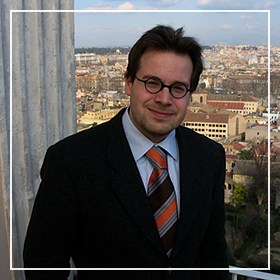ALLEGRA: So, Kaius Tuori, we heard that you recently received a new position – Congratulations! Would you mind telling just what is it (and why did they give it to you)?
KAIUS TUORI: Thanks for asking! I was recently appointed as a university lecturer in European studies at the University of Helsinki, my first ever permanent appointment.I would hazard to guess that I was chosen because of my studies in the intellectual history of Europe, where I have been working on issues such as self-definition, identity, invention of tradition etc. My main line of inquiry is in how the past is used as a way to define oneself and how changes in one’s identity are reflected in one’s view of the past.
For example, how after the collapse of totalitarian regimes in Europe formerly intense nationalist historians refashioned themselves as Europeanists and began to write history based on a European focus. What has interested me is how strong an influence classical antiquity and its idealization has played in the formation of European identity.
ALLEGRA: Your fields of speciality are quite broad (history, archaeology, anthropology, law) – would you call yourself: a) a legal historian with anthropological inclinations; b) a historical anthropologist of the law; c) an anthropologist of legal history; d) Who cares? Why?
KT: That’s a tough one. Does it matter? Primarily, I would consider myself a bad historian, who dabbles in law, is a novice in anthropology and is useful in archaeology only because of his ability with a wheelbarrow. Right now I am working on getting my larger ERC project on lawyers, totalitarianism and European tradition (see foundlaw.org!) really moving. We have now two post-docs – Jacob Giltaj and Tommaso Beggio – and one grad student working Ville Erkkilä on it, using interesting methodology like psychohistory to analyze the mindscapes of these people… On the side, I am trying to finish for delivery a book long in the works titled Lawyers and Savages, which is about the history of legal anthropology. There is so much interesting stuff out there. Right now I am reading about an early Bavarian explorer to Brazil called Carl Martius, who made a fantastic study on the legal traditions of the Tupi, based on ancient Roman law. Or a Swiss nineteenth century legal anthropologist called Johann Bachofen, who formulated theories on the original state of matriarchy based on Greek myth and unreliable reports from Tahiti.
A: What, to you, will be the most relevant issues/themes within legal anthropology (and stuff) in the next foreseeable future? Whose work inspires you just now and why?
KT: That is another tricky one. The definition of relevance is such a nice way of revealing preferences that I have to hedge my bets here. Relevance in terms of political, economic and social issues, I would have to say land rights issues, but mainly because of the ongoing political momentum and the exciting developments that have taken place in the field. However, in terms of pure science and methodology I would say that the most potential is still in the area loosely defined as studies on identity, gender, queer and weird. Beyond the crit fascination on all things outré, I truly believe that to be innovative, science has to have a strong potential to disrupt, question and change perspective. Also, I am a big fan of the stuff perceived as strange and weird. For my main line of work, the biggest inspiration has been Sally Merry, whom I have been fortunate enough to meet when I have been at NYU as post-doc. She has an interesting way of discussing the uses of tradition and identity politics in legal and political disputes.
A: When was the last time you were bored at an academic context and for what reasons? (please disguise any information that might give away the identities of actual persons involved – and for anyone wondering about this particular question, stay tuned to unfolding Allegra discussions on the Anthropology of Boredom!)
KT: Oh, let’s not get started on this one. I have the intellectual stamina of a goldfish.
A: If we were stranded on a deserted island and could take just ONE of your texts with us, which should be (and again, why)?
KT: I would probably choose the thickest one, to use as kindle.
A: Thanks for your time! We look forward to many more fruitful discussions – and of course endless contributions for Allegra!
KAIUS TUORI: Why thank you! I have been stunned how fast Allegra has taken off. There evidently was quite a need for something like this.





